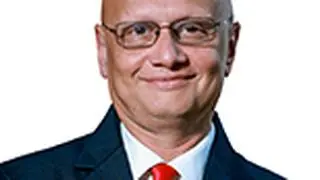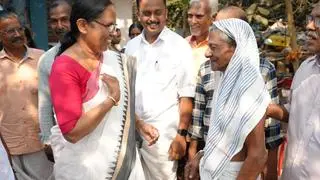The demise of Vishwa Hindu Parishad (VHP) patron Ashok Singhal on Tuesday morning leaves the task of completing his lifelong project – the construction of a temple at the disputed Ramjanmabhoomi-Babri mosque site – to the far more aggressive Pravin Togadia. To an extent, Singhal’s death also signals the end of the ruling BJP’s recent bonhomie with the VHP and a hardening of the Hindutva agenda.
Singhal, 89, died after a lung infection, having fathered a movement which served to push the BJP from the fringes to the mainstream of Indian politics. Born in Agra to a middle class family, Singhal joined the RSS as long back as 1942 and remained loyal to its core ideological goal of creating a Hindu Rashtra. He was jailed when the RSS was banned after Mahatma Gandhi’s assassination and his most remarkable achievement was to kickstart the Ramjanmabhoomi movement after taking over the VHP in 1981.
But of late, especially after Narendra Modi led the BJP to a staggering victory in the general elections, his belligerence on the Ayodhya issue had waned. This development was largely attributed to his harmonious relations with the Prime Minister, quite unlike his public disapproval of BJP veteran and former PM Atal Behari Vajpayee. Singhal is known to be among the few influential voices supporting Modi’s anointment as the BJP’s Prime Ministerial candidate in the face of stiff opposition from L. K. Advani, Murli Manohar Joshi and a section of the RSS.
The PM’s tribute on Tuesday is a testimony to his relationship with Singhal. “I was always fortunate to receive Ashokji’s blessings and guidance. My condolences to his family and countless supporters. The demise of Singhal ji is a deep personal loss. He was an institution in himself whose life was centred around serving the Nation,” the PM said.
Singhal’s death is expected to end a period in which the VHP enjoyed unprecedented camaraderie with the BJP. The end coincides with the demise of the PM’s friend Singhal and rise of the more mercurial Pravin Togadia, a known Modi baiter in BJP circles.
Togadia is currently the International Working President of the VHP. The post of International President is being held by a much mellower G. Raghava Reddy, the owner of a chain of sweet shops in Andhra Pradesh. Reddy’s appointment in 2011 was enforced by the RSS Chief Mohan Bhagwat in collaboration with Ashok Singhal to sidestep the claim of the feisty Togadia. Singhal was also grooming the relatively non-descript Champat Rai and Dinesh Chandra for larger role in the organisation.
But as a few Sangh insiders pointed out after Singhal’s demise, Togadia remains the only recognisable face of the VHP who strongly articulates its aggressive Hindutva agenda. “His profile is bound to increase. VHP is a mass-based organisation. The personality and commitment of a leader is valued by the cadre,” said an RSS insider.
This could be a significant factor in altering the VHP-BJP relations which Singhal had kept more or less on an even keel since the general elections last year. There was no vehement demand for beginning construction of the temple despite the Allahabad High Court making three-way division of the disputed land which gives the portion below the central dome where idols of Lord Rama and other deities are placed in the makeshift temple to the Hindus.
In his last public pronouncement on the issue on September 30, Singhal was sanguine about the pace of the efforts to construct the temple. He refused to blame the Government for the Ram temple remaining more or less a non-starter and merely announced the beginning of consultations on the issue at a seminar next year in January. “The Supreme Court has still to pronounce its judgement. The Government has to wait,” was all Singhal was willing to say to repeated questions about why he is not pushing the BJP to initiate the process despite a majority in Parliament.
Contrast this with the VHP’s routine and strident attacks directed specifically at Atal Behari Vajpayee during his tenure as Prime Minister. “The BJP has nothing to offer to Hindu sentiments as it has abandoned the demand for Article 370, Ayodhya and Uniform Civil Code,” said Singhal on September 15, 2003. Another VHP leader, Giriraj Kishore, advised Vajpayee to retire while there was a constant accusation of “abandoning principle and ideology”. Togadia, who has not been heard much in the last 18 months, was much more vocal during the last NDA Government’s tenure, accusing Vajpayee of pandering to Pakistan and even “harbouring terror sponsors”.
Toganida’s expected rise is likely to bring back these memories and Hindutva issues to centrestage. Although the RSS is more supportive of the present dispensation than it was of the Vajpayee regime, Togadia is not an easily controlled character. The BJP and the PM will miss Singhal in the days and weeks to come.







Comments
Comments have to be in English, and in full sentences. They cannot be abusive or personal. Please abide by our community guidelines for posting your comments.
We have migrated to a new commenting platform. If you are already a registered user of TheHindu Businessline and logged in, you may continue to engage with our articles. If you do not have an account please register and login to post comments. Users can access their older comments by logging into their accounts on Vuukle.